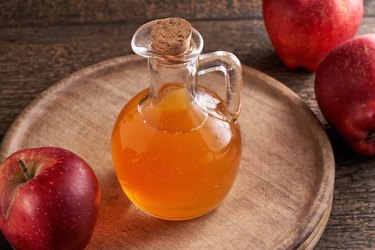
Apple cider vinegar (ACV) is often touted as a cure-all and natural elixir for many woes — including irritable bowel syndrome (IBS). But despite its panacea status, limited evidence exists to support these claims that ACV benefits those with IBS. So before you sip on, get the facts.
Read more: What Is IBS, Exactly?
Video of the Day
Video of the Day
An Apple Cider Vinegar a Day?
Inquiring minds clearly want to know if ACV's long history of being used for medicinal purposes has any promise. According to Harvard Health Publishing, ACV is trending in recent years on Google for people seeking a natural elixir for myriad health conditions.
Ten percent of the U.S. population has IBS, according to Harvard Health. If that number includes you, you may be wondering whether ACV can help alleviate your symptoms.
The answer isn't cut and dried. According to the International Foundation for Gastrointestinal Disorders, your bowel and its trillions of bacteria are vital to breaking down the food you eat and regulating bowels and immune function. Though more needs to be learned about the possible role bacteria plays, a change to the amount or kind of bacteria in your gut could be one contributor to IBS flare-ups, the foundation says — which prebiotics could temper.
One way to stimulate the growth of healthy gut bacteria, Columbia University Irving Medical Center says, is by eating prebiotic-rich foods, which provide nutrients for gut bacteria that could potentially improve bowel function and digestion.
Enter ACV. Prebiotics like ACV may be useful for some digestive symptoms by "balanc[ing] the probiotics and good bacteria of the gut, which helps with the digestive process by decreasing gas and bloating," Chaim Ross, MD, a gastroenterologist at NYU Langone Health in Great Neck, New York, says.
Gut Check: ACV for IBS?
But before you buy a bottle of ACV for IBS, take a look at the research. An April 2019 study of 729 patients in the American Journal of Clinical Nutrition found prebiotics did not improve IBS symptoms.
Dr. Ross agrees: "There is a lack of evidence from scientific research regarding the benefits of apple cider vinegar for irritable bowel syndrome. And most recommendations to use it for the treatment of IBS [are] from anecdotal data, which seems to show that it is helpful to treat digestive symptoms."
While you're weighing whether to add ACV to your supplements list, heed potential drawbacks of regular consumption. While it can be beneficial for the digestive tract in small quantities, in larger doses, the acidic properties of ACV can cause "damage to dental enamel, burning of the throat and esophagus, nausea and an upset stomach," Dr. Ross says.
Columbia University Irving Medical Center also cautions that some people may be more sensitive to prebiotics than others, which could worsen IBS symptoms.
Try This to Manage IBS
Because gut health arguably begins and ends with your diet, to manage your IBS symptoms, the National Institute of Diabetes and Digestive and Kidney Diseases (NIDDK) advises eating more fiber, avoiding gluten and following a low-FODMAP (fermentable oligosaccharides, disaccharides, monosaccharides and polyols) diet.
A small January 2014 study in Gastroenterology that assigned 30 IBS and eight healthy patients to either a low-FODMAP or a typical Australian diet found patients with IBS had lower overall GI symptom scores on a diet low in FODMAPs.
Beyond focusing on eating low-FODMAP foods (which include foods like bananas, strawberries, carrots, almonds and oats), it's important to restrict or even avoid high-FODMAP foods (which include foods like garlic, onions, apples and broccoli), at least temporarily. Higher FODMAP foods are not absorbed well by the small intestine, so these foods increase the fluid in your intestines and create extra gas, cause bloating and affect digestion rate, according to Harvard Health.
For the bloating and abdominal pain, Johns Hopkins Medicine suggests consuming low-carbohydrate foods and avoiding foods high in lactose, fructose and sorbitol, as well as reducing your caffeine and fatty food intakes, as these can induce colonic contractions that can also cause diarrhea.
Beyond your diet, IBS symptoms may be improved with such lifestyle changes as upping the amount of exercise and sleep you get, plus lowering your stress, the NIDDK says.
- Harvard Health Publishing: “Apple Cider Vinegar Diet: Does It Really Work?”
- Harvard Health Publishing: “Try a FODMAPs Diet to Manage Irritable Bowel Syndrome”
- International Foundation for Gastrointestinal Disorders: “What Causes IBS?”
- Columbia University Irving Medical Center: “What You Need to Know About Prebiotics”
- American Journal of Clinical Nutrition: “Prebiotics in Irritable Bowel Syndrome and Other Functional Bowel Disorders in Adults: A Systematic Review and Meta-Analysis of Randomized Controlled Trials”
- Chaim Ross, MD, gastroenterologist, NYU Langone at Great Neck Medical, Great Neck, New York
- National Institute of Diabetes and Digestive and Kidney Diseases: “Treatment for Irritable Bowel Syndrome”
- Johns Hopkins Medicine: “Irritable Bowel Syndrome Treatment”
- Gastroenterology: “A Diet Low in FODMAPs Reduces Symptoms of Irritable Bowel Syndrome”
- IBS Diets: “FODMAP Food List”
Is this an emergency? If you are experiencing serious medical symptoms, please see the National Library of Medicine’s list of signs you need emergency medical attention or call 911.